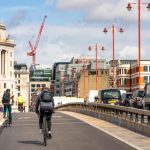The government is expected to unveil a £250m investment in UK cycle lanes to encourage commuters to ride to work instead of using public transport, as part of the effort to prevent a resurgence of coronavirus.
Grant Shapps, the transport secretary, is expected to make the funding announcement during his appearance at the Downing Street coronavirus briefing on Saturday.
There are also plans to fast-track trials of the use of e-scooters on British roads, according to the Press Association. Currently, electric scooters – which can travel at up to 15.5mph – are banned on roads and pavements in the UK.Is air pollution making the coronavirus pandemic even more deadly?Read more
The government launched a consultation about legalising e-scooters in March and would need to pass secondary legislation to legalise their use.
Campaigners have called for a fundamental redesign of the transport system to help prevent a bounce-back in air pollution levels once the lockdown ends.
Studies have shown that air pollution may play a role in higher Covid-19 mortality rates, with hearts and lungs weakened by dirty air.
In Italy, coronavirus was detected in air pollution samples by scientists who are investigating whether this could enable it to be carried over longer distances and increase the number of people infected.
Nine organisations including Greenpeace and the Transport Action Network have written an open letter to the UK secretaries of state for transport and the environment, as well as the chancellor, leaders of local and regional authorities and city mayors.
“It would be completely absurd if, after the unprecedented efforts and sacrifices made to save thousands of lives from Covid-19, we allowed thousands more to be cut short by the devastating impacts of toxic pollution,” the letter reads.
The group’s demands include wider pavements, protected cycle tracks and the installation of bus gates, bollards and planters to limit traffic in residential and shopping streets. The letter also calls for networks of low-traffic neighbourhoods and for walking and cycling to be prioritised along main roads.
Greenpeace UK, CPRE, Cycling UK, the Environmental Defence Fund, Global Action Plan, Living Streets, Possible, Transport Action Network, and Transport and Environment have signed the letter.
The campaigners also suggest introducing a 20mph speed limit in built-up areas and a ban on the sale of new petrol and diesel cars and vans by 2030.
Restrictions brought in to tackle the coronavirus pandemic have led to a huge drop in road traffic and a fall in air pollution of up to 60% in parts of the UK.
A YouGov poll commissioned by Greenpeace UK found 71% of people were concerned about the possibility of air pollution returning to pre-lockdown levels once restrictions are lifted.
It also found that 58% backed the introduction of cycle lanes on urban main roads along with increased government funding for walking and cycling infrastructure.
The letter calls for immediate action to lock in some of the reduction in road traffic and the introduction of measures to ensure that “when the nation gets moving again, it does so in a cleaner, safer way”.
Rebecca Newsom, Greenpeace UK’s head of politics, said Milan and Brussels had already taken steps to prioritise walkers and cyclists in their city centres.
“There are many things about the lockdown people will be glad to leave behind, but cleaner air is not one of them,” she said. “Yet there’s a real risk that congestion and toxic pollution will be back on our streets as soon as restrictions are lifted.”





